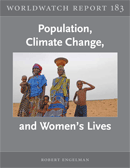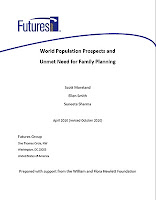A new
Worldwatch Institute report, “
Population, Climate Change, and Women’s Lives,” by
Robert Engelman, discusses the relationship between women’s equality and climate change. Slowing population growth will reduce greenhouse gas emissions and help societies adapt to climate change, says Engelman. What’s more, this can only be done through an investment in women’s rights and education. Population change comes primarily through reducing unintended pregnancies by offering men and women access to family planning services, improving education for all (especially girls and women), and promoting full gender equality. “Population change should be viewed as one element of the historic effort to bring women into equal standing with men,” writes Engelman.
A recent report by Scott Moreland, Ellen Smith, and Suneeta Sharma of the Futures Group analyzes just what the impact of meeting the unmet need for family planning would be on global population growth. Looking at 99 developing countries and the United States, the report, titled World Population Prospects and Unmet Need for Family Planning, found that by gradually meeting the global demand for family planning, population would be reduced to 6.3 billion people by 2050, below current world population and well below the UN medium fertility variant prediction, which is derived from past trends but does not take into account meeting unmet need for family planning. Meeting this need would only cost $3.7 billion more per year than the UN medium fertility variant scenario and less than the low scenario. $1.4 billion of this would cover the unmet demand in the United States.
 A Publication of the Stimson Center.
A Publication of the Stimson Center.





